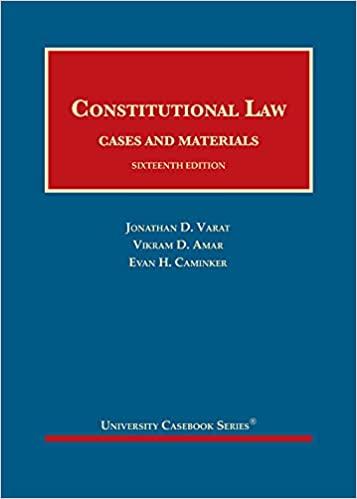Question
Witham tendered successfully for the supply of coal to the Great Northern over a period on one year. In his tender, Witham undertook to supply
Witham tendered successfully for the supply of coal to the Great Northern over a period on one year. In his tender, Witham undertook to supply such quantities as Great Northern may order from time to time. Assume that the tender was on Feb 15, the winner was announced of March 15 and the obligations pursuant to the tender began on April 1. Suppose that on June 1, Witham informed Great Northern of intent to opt out. Suppose that Great Northern placed the following orders on Witham on the following dates:
Date of OrderCoal (tons)
April 12
25,000
May 3
75,000
June 18
45,000
June 30
100,000
July 15
85,000
August 12
65,000
Sept 5
85,000
Q1: Suppose that on June 1, Witham mailed Great Northern a registered letter announcing an intent to opt-out. If in the tender the opt-out notice period is stipulated as 60 days from the date of the receipt by the tender awarded five days subsequent to mailing,
[a] On what date will obligations of the tender awardee cease pursuant to the opt-out? [b] How many tons will the tender awardee be obligated to supply the tender awarded?
[c] Assume that the tender awarded supplied no coal to the tender awardee and plans to sue the
tender awarder. How much ordinary damages is the tender awarded likely to be awarded if, in
1873, the price of anthracite coal in the market was $4.27 (https://fraser.stlouisfed.org/files/docs/publications/stat_abstract/pages/18654_1915-
1919.pdf ) but in the tender, the price was stipulated at the forward price of $3.77 for that year.
Q2: Consider the following hypothetical based on Bradbury v Morgan
The facts: A offered to guarantee payment by C in respect to goods to be supplied by the claimant of credit to C. A died and the claimant, with knowledge of his death, continued to supply goods to C. The supplier Bradbury then sued A's executors on the guarantee.
[a] Which rule should be applied in this case? In terms of typology, what kind of rule is it?
[b] Does X's executor have to honor the guarantee? Explain.
[c] What legal theory can the executor site militating against Bradbury? Given the facts of the case, is that legal theory dispositive of the outcome of the case? Answer YES or NO and explain.
Step by Step Solution
There are 3 Steps involved in it
Step: 1

Get Instant Access to Expert-Tailored Solutions
See step-by-step solutions with expert insights and AI powered tools for academic success
Step: 2

Step: 3

Ace Your Homework with AI
Get the answers you need in no time with our AI-driven, step-by-step assistance
Get Started


